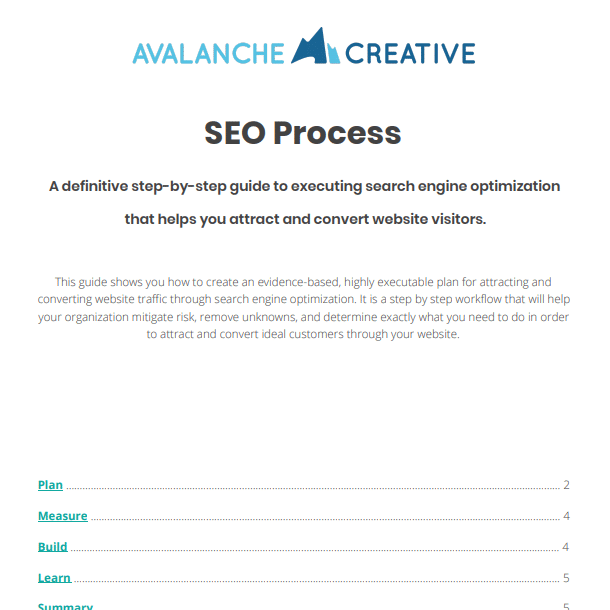Eight Tips for Local SEO for Healthcare
Category: Healthcare, Search Strategy | Tags:
Targeting local customers is a key part of any healthcare SEO strategy. Even as telehealth gains popularity for some services, studies show that more than 70% of patients still prefer in-person visits.
Avalanche has years of experience helping healthcare companies of all kinds create effective, data-driven SEO strategies with long-term results. We’ve put together our favorite local SEO tips for healthcare to help you build or improve your strategy.
Our Tips for Local Healthcare SEO
1. Research Local Competitors
One of the first steps in any healthcare SEO strategy is a competitive analysis to see what your local competitors are ranking for and what strategies they’re using to do it. Many successful healthcare companies have been implementing local SEO strategies for years, and they’ve likely identified good keywords that you’ll want to add to your list.
2. Identify Local Keywords
Armed with your competitive analysis, you can start identifying local keywords that your customers are using to search. One of the best things about implementing local SEO for healthcare professionals is you can base it on hard data. By using tools such as SEMrush or Ahrefs, you may find that people are being remarkably specific with the keywords they’re using to search. For instance, if you serve the Detroit area, you may find patients searching “physical therapy bloomfield hills,” “arthritis relief troy” or “back pain warren.”
3. Create Local Content
Once you’ve identified all the local SEO keywords that are relevant to your business, you’ll want to target each one of them to catch as many potential customers as you can, either with individual pages and blogs or specific sections on those pieces.
That may seem like a lot of time and effort (and it certainly can be) for a lot of little sections of your service area, but over time they can add up to significant gains for your business. It also helps with more vague location searches, such as “physical therapist near me” or just “physical therapy services,” since Google will connect the searcher’s location with your content targeting that location.
We often create state and city pages for our clients (depending on the size of their coverage area) so they can catch as many local searches as possible. Using a template structure for the different types of pages can help save a lot of time for your SEO team, writers, and web designers.
4. Build Your Google Business Profile
A solid Google Business Profile is a key aspect of any healthcare local SEO strategy. It’s the listing of information that comes up, on the right-hand side of the screen if you’re using a desktop, to show reviews, location information, hours of operation, and other key details.
If you don’t already have a Google Business Profile, you’ll want to create one immediately as soon as you can and get the information verified. You’ll need to choose an exact location, write a short description of your business, and fill in a few other details. Once you’re finished, you’ll need to get it verified using a postcard that Google will send to the address you provided and following the instructions to enter the verification code.
5. Leverage Local Citations
A local citation is an online mention of your business that includes the name, address, and phone number. Most local citations are going to be in business directories, social media sites, and other platforms people may use to look for businesses. They are important to your domain authority and ability to rank because they lend credibility to your website and show Google that your business is legitimate.
In order to capitalize on local citations, you’ll want to track down any instances and claim them so that you have control over them and ensure the information is accurate. If you spot any instances of duplicate or fraudulent listings, you’ll want to contact the respective platform to get them taken down. You should also look for opportunities to create new local citations in business directories
6. Cultivate Your Reviews
A great way to strengthen your Google Business Profile and build customer strength in your business is to grow the number of good reviews on your profile. It’s not just the star rating that Google will pay attention to, but the number of reviews on the listing. The more reviews you have, the more the search algorithms will recognize your business and legitimate and useful to potential patients.
7. Develop a Helpful Blog
Choosing between healthcare businesses is always a major step, and people like to do their research so they can feel confident that they’re making the right decision. Having a blog filled with helpful, valuable content that visitors can spend time on and get a sense of your company is a great way to help build trust in your services.
It’s also a great way to improve your SEO. The longer people spend on your website reading content, the more Google sees that you have something valuable to provide, and it will help boost your rankings on the search engine results pages (SERP). Plus, blogs are essential to cultivating helpful backlinks to your website.
We always recommend creating content that feels like it was written by humans—for humans. Content with a lot of fluff, repetition, and walls of text will send potential patients to look for another website.
8. Identify Backlinking Opportunities
Another way to give your website domain authority in the eyes of Google’s search algorithm is through backlinks. Less formal than local citations, backlinks can come from anywhere, and they also show Google that you have valuable, useful information on your website. Think of a backlink as someone vouching for you, it shows that they have visited your website, liked what they saw, and decided to recommend it to other people. It’s even better if their website has a good domain authority as well.
But not all backlinks are created equal. There’s a difference between “dofollow” and “nofollow” links, and it’s written into the code of the link itself. Dofollow links do lend credibility to your website, but nofollow links do not. Much like with local citations, you’ll want to track down the backlinks to your site and see if you can ask any websites with nofollow links to change them to dofollow links.
Share this article:
The Avalanche Email: Fun. Simple. Educational. No Selling.
Learn Result-focused SEO & Content
Join over 2,272+ others who get one email every Wednesday with simple instructions on how to get more website traffic and leads through SEO and content marketing. (Learn more about the email)
CONTACT US
Talk to the Healthcare SEO Experts

Ready to jumpstart your local SEO for healthcare? Reach out to the expert team at Avalanche Creative. We’ve worked with healthcare companies of all shapes and sizes to create effective SEO strategies that bring in high-quality leads.
Related Resources

Download our SEO Process.
Keep Learning
Creating the Perfect SEO Content Template in Google Docs
Learn how to create an SEO Content Templates in Google Docs to help drive new traffic to your website from the search engines. SEO Content Templates provide specific recommendations and directives for creating new content on your website with the purpose of improving your SEO.
How To Show Up in Gemini (And Win More Local Jobs)
Show up in Gemini when homeowners search for landscaping services. Build the right signals on Google and your website to win more qualified local jobs.
How to Run Google Ads for Landscapers: A Complete Guide
Learn how to set up Google Ads for landscapers, attract qualified leads, and win more local jobs with this step-by-step guide.
🏔️ Watering > Planting New Seeds
Your next marketing win may already be on your site. Learn how to optimize existing pages for better rankings, traffic, and results.
The Recipe vs. The Meal
Your customers buy the experience, not the product. Discover a simple way to shift your message from ingredients to the full meal.
What’s the Best CMS for Landscaping Businesses?
Compare the best website platforms for landscapers. Learn the pros and cons of Wix, Squarespace, and WordPress, and why WordPress is best for long-term SEO.




